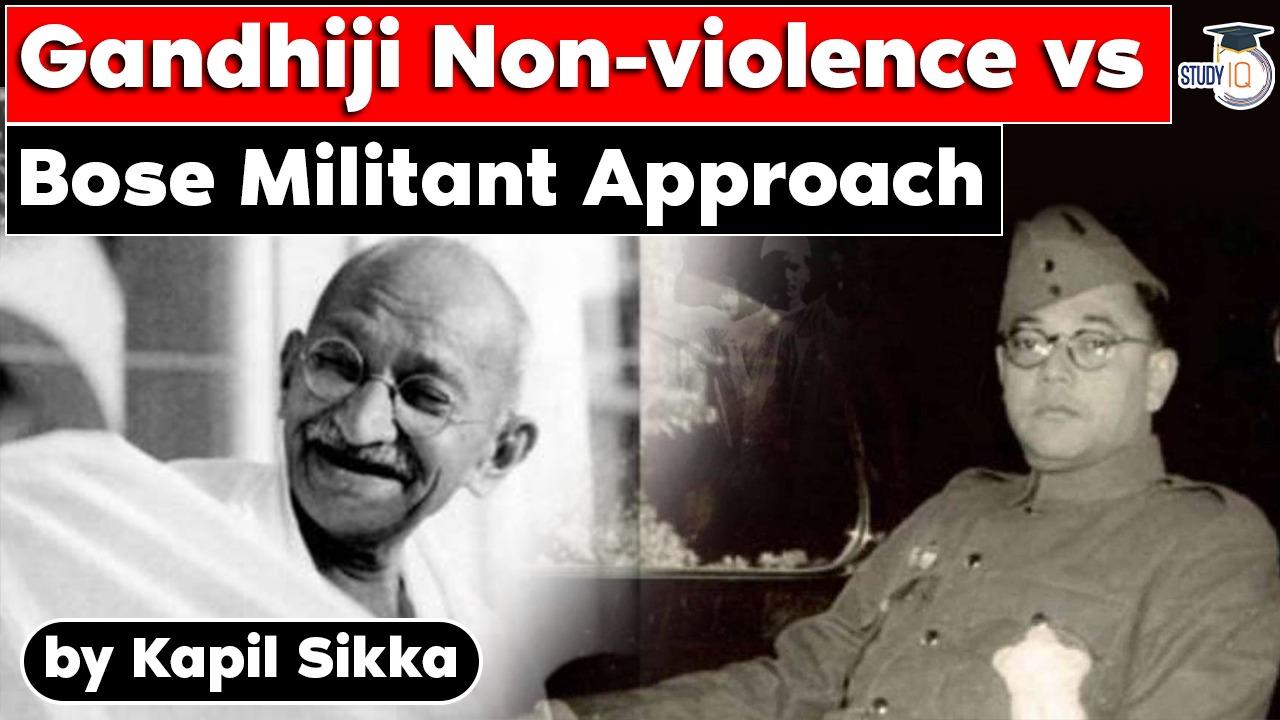Table of Contents
What Won Us Independence: Gandhi’s Non-Violence Or Armed Struggle?



- As George Orwell said, “Who controls the past controls the future. Who controls the present controls the past.”
- India’s Republic Day parade in 2019 featured for the first time veterans of the Indian National Army (INA), which waged an armed struggle against British colonial rule.
- Four INA veterans in their 90s rode a jeep in a parade that, paradoxically, showcased the life experiences of the apostle of non-violence, Mahatma Gandhi, through 22 tableaux.
The Political Power of Gandhi
- The fact that he was a “half-naked fakir”, as Churchill said, enabled Gandhi to achieve the impossible task of mobilising the anger of the people and turning it into a constructive force.
- the Gandhi-led non-violent independence movement played a critical role both in galvanising grassroots resistance to British rule and in helping to gain independence.
- The meaning of his calls was very localised and thus resonated with the oppressed. Gandhi knew well how to shake the core of the British Empire.
But bose was equally important
- But the decisive factor was the protracted World War II, which reduced to ruins large swaths of Europe and Asia, especially the imperial powers.
- The war between the Allied and Axis powers killed 80 million, or 4% of the global population.
Quit India
- If one looks at the history of the Indian Freedom Movement, after Mahatma Gandhi, the name that stands out is of Netaji Subhas Chandra Bose. His contribution is no less than that of Mahatma Gandhi
- Netaji’s cry, “Quit India” became his slogan. On 7 August 1942, AICC met in Bombay (now Mumbai). Most uncharacteristically, Gandhiji told the members, “We shall get our freedom by fighting. It cannot fall from the skies”. On 8 August 1942, the resolution was passed by an overwhelming majority. The next day, the British government struck.
And bose’s Methods also helped
- Despite the Allied victory, a devastated Britain was in no position to hold on to its colonies, including “crown jewel” India.
- Even colonies where there was no grassroots resistance to colonial rule won independence in the post-World War II period.
- The British had dominated India through a Machiavellian divide-and-rule strategy.
- Their exit came only after they had reduced one of the world’s wealthiest economies to one of its poorest.
- Indeed, they left after they had looted to their heart’s content, siphoning out at least £9.2 trillion (or $44.6 trillion) up to 1938, according to economist Utsa Patnaik’s recent estimate.
- Countless numbers of Indians died due to British colonial excesses. Just in the manmade Bengal famine of 1942-45, six to seven million starved to death (a toll far greater than the “Holocaust”) due to the British war policy of diverting resources away from India.
- Britain sent Indian soldiers in large numbers to fight its dirty wars elsewhere, including the two world wars, and many died while serving as cannon fodder.
- Indeed, the present Indian republic was born in blood: As many as a million civilians died in senseless violence and millions more were uprooted in the British-contrived partition.
Mutinies that shook the empire
- The Naval mutiny in Bombay in 1946 was followed by another among the ground crew in the Royal Indian Air Force.
- An Army mutiny broke out at Jabalpur during the last week of February 1946, which had to be put down with difficulty
- While the Subhas Chandra Bose-led INA could not mount a formidable threat to a British colonial military overflowing with Indian recruits, the Bombay mutiny and other sepoy revolts of 1946 triggered by INA prisoners’ trials undermined Britain’s confidence in sustaining the Raj, hastening its exit.
- Lord Clement Attlee on his decision to grant Independence to India; the latter cited among several reasons, the principle reason was erosion of loyalty to the British Crown among the Indian Army as a result of the military activities of Netaji
On Contrary: is Gandhi still relevant
- Non-Violence a Strategic Tool: Violent uprisings could have never managed to generate the international pressure that non-violence did.
- Non-Violence as Soft Power: Jamila Raqib, a non-violence activist, speaks of how people in Mosul refused to send their children to school when ISIS captured the town and instituted an extremist curriculum.
But
- even if one assumes that it was Bose and not Bapu who earned India independence, it is crucial to give Gandhi the benefit of doubt.
- If all power came from the barrel of a gun, as Mao Zedong believed, our war-plagued world will take humanity to hell.
- Military and lethal weapons have failed to produce peace.
Nevertheless: Gandhi Acknowledged it
- You have achieved a complete unity among the Hindus, Muslims, Parsis, Christians, Anglo-Indians and Sikhs in your ranks.
- That is no mean achievement.” So far so good. He then went on to say, “Above all, you must never beg or throw yourselves on anybody’s charity. Because you have risked your lives for India’s sake and fought for her on the Imphal plains






















 WhatsApp
WhatsApp